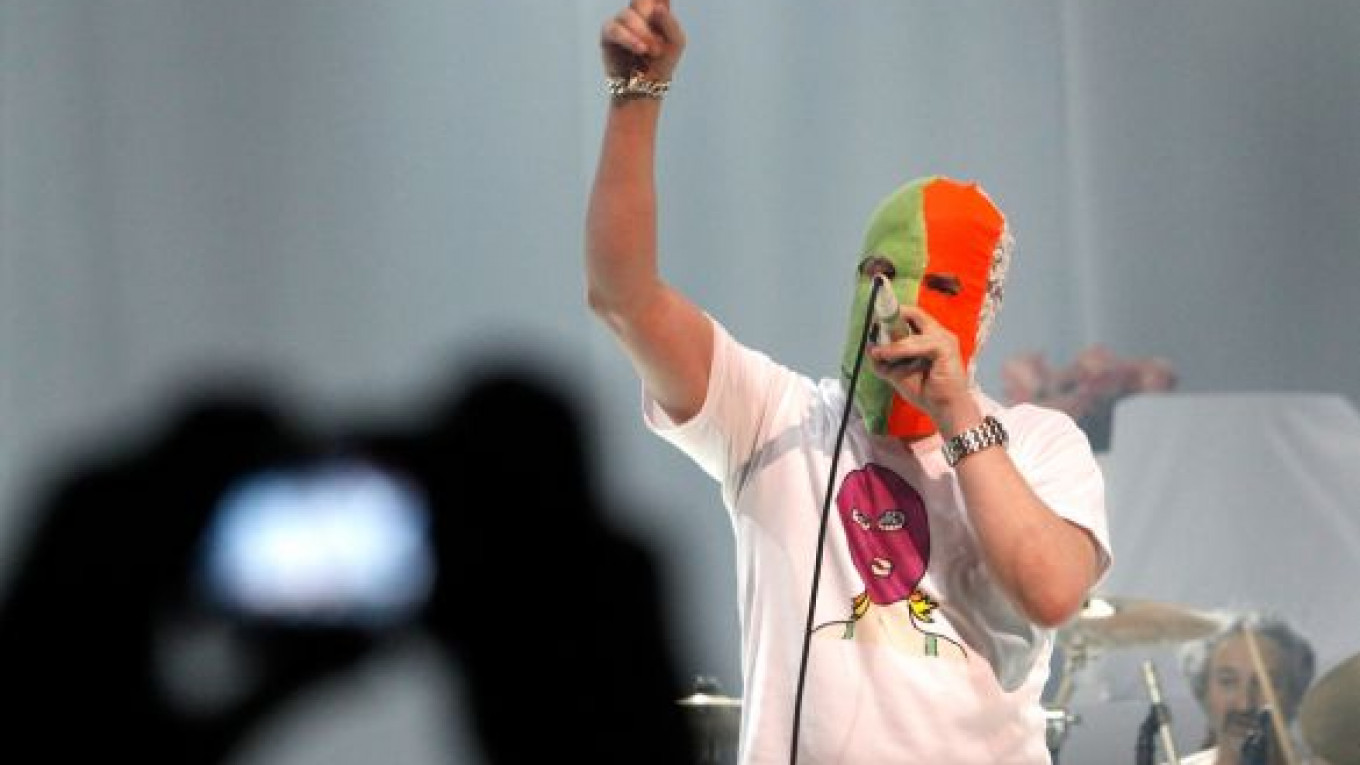ST. PETERSBURG — With more and more Western musicians — from Red Hot Chili Peppers to Peter Gabriel and Sting — showing their support for Pussy Riot, the female punk rockers who have found themselves behind bars for an anti-Putin performance in a Moscow church in March, Russian musicians are being criticized for not showing enough support.
Last week British musician Peter Gabriel wrote to the women offering his support following backing from, among others, the groups Franz Ferdinand, Red Hot Chili Peppers and Faith No More.
"Nadya, Katya, Masha, you have the right to make your own prayers — from the heart," he wrote. "I hope you will be released very, very soon. We are all watching."
Pussy Riot supporters have also appealed to Madonna, asking her to show her support when she performs in Russia this week.
Most leading Russian bands, however, seem uninterested, or as if they don't want to risk supporting Putin's foes.
Three Russian and Ukrainian mainstream rock bands declined to support Pussy Riot at a London concert last week, according to London-based activist Andrei Sidelnikov.
Sidelnikov wrote on Facebook that he brought Free Pussy Riot T-shirts and asked Mumiy Troll frontman Ilya Lagutenko, Igor Sukachyov of Garik Sukachyov i Neprikasayemiye and Oleg Skripka of the Ukrainian band Vopli Vidoplyasova to wear them during the show, but all three declined.
Skripka, whose band frequently performs in Russia, was quoted by Sidelnikov as saying that backing Pussy Riot was "dangerous," even though the musician was one of the key figures during the Orange Revolution protests in his hometown of Kiev in 2004-2005.
"I didn't really think they would agree, so their refusal was ultimately predictable," Sidelnikov wrote.
"The only surprising thing was the reaction of Ilya Lagutenko, who categorically refused not only to speak, but asked the organizers to ensure that I didn't appear close to him under any circumstances — that there be no photographs in which he could be shown next to the slogan."
Nevertheless, there are a few local musicians supporting the women. A Pussy Riot support committee — featuring opposition activists and artists — was established in St. Petersburg with the aim of holding benefit events in the city beginning in early September.
Televizor's Mikhail Borzykin and the Electric Guerillas' Vadim Kurylyov are so far the only musicians on the committee, which includes actors Andrei Devotchenko and Larisa Dmitriyeva, as well as film director Andrei Nekrasov.
The committee said it hopes that the number of musicians on the committee will increase, referring to international support for the cause and an open letter calling for the release of the women, who have been held in custody for nearly five months. The letter has been signed by artists and musicians including Mashina Vremeni's Andrei Makarevich and Akvarium's Boris Grebenshchikov, who had earlier been criticized for their support of the Kremlin.
Pussy Riot committee organizers addressed St. Petersburg venues, asking them to hold an event scheduled for September. Venues often cancel politically charged events out of fear of being shut down by the authorities.
"Clubs are always under scrutiny and pressure," Borzykin said.
"Even before our most recent concert a month ago, the club's management said they had received a call from the Federal Security Service warning musicians to be more cautious and not to say anything that could cause them to be prosecuted under the law. This was an attempt to intimidate the musicians. "
Even if bands manage to hold protest concerts, they tend to do so in a secretive way, which does not help much to promote the cause.
Few heard about a punk concert in support of Pussy Riot that was held last month at a local bar on Dumskaya Ulitsa on July 20, the day before the court prolonged the detention of the imprisoned women by six months.
Advertised on a Russian social network and attended by about 50 fans, bands spoke out about the cause from the stage and dedicated songs to the imprisoned women, but no posters were to be seen, while a sign on the door described the event as a "private party."
Venue managers are so afraid of anything political taking place that when the band put an anti-Putin leaflet on the wall for its recent concert in another bar, the group was immediately approached by the bar's management, who demanded they take it down, said Alexander, one of the organizers. He also said the organizers wanted to avoid a possible attack from Orthodox radicals.
In the past few years, most opposition-themed cultural events have officially been canceled due to alleged roof leaks or fire safety violations. Although the authorities deny playing a role, insiders insist they are the ones behind the cancellations.
Borzykin says the organizers hope to hold a bigger concert, featuring some well-known acts, on either Sept. 1 or 2.
"The situation is aggravating and something should be done immediately; it's not clear what will happen to the girls if they are sent to a [prison] camp," he says.
A Message from The Moscow Times:
Dear readers,
We are facing unprecedented challenges. Russia's Prosecutor General's Office has designated The Moscow Times as an "undesirable" organization, criminalizing our work and putting our staff at risk of prosecution. This follows our earlier unjust labeling as a "foreign agent."
These actions are direct attempts to silence independent journalism in Russia. The authorities claim our work "discredits the decisions of the Russian leadership." We see things differently: we strive to provide accurate, unbiased reporting on Russia.
We, the journalists of The Moscow Times, refuse to be silenced. But to continue our work, we need your help.
Your support, no matter how small, makes a world of difference. If you can, please support us monthly starting from just $2. It's quick to set up, and every contribution makes a significant impact.
By supporting The Moscow Times, you're defending open, independent journalism in the face of repression. Thank you for standing with us.
Remind me later.






